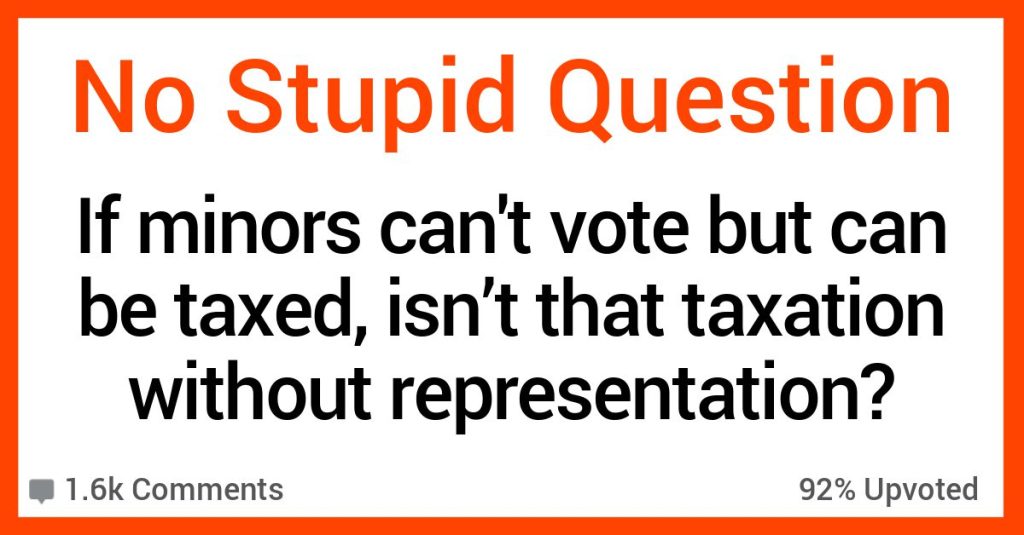Trending Now
I’ve often thought about this question myself…
If minors can’t vote but they still get taxed, isn’t that taxation without representation?
And I bet you have, too!
Let’s see what AskReddit users had to say about this so we can finally get some clarity on this issue.
1. The theory.
“The theory is that their parents’ votes represent their interests.
In practice, it’s roughly a two-year period and no one cares.”
2. Insanity!
“If you have a job at 12 and pay taxes, then why shouldn’t a 12 year old vote?
That would just be insane in the sense of they are not developed enough to make decisions like that.”
3. There you go.
“Voting age, much like the age you’re considered old enough to smoke, drink, register for Selective Service, be called for jury duty and so forth is completely arbitrary.
Considering current thinking is we’re not remotely developed enough until at least our mid-20s (and much later for many) one could also argue people shouldn’t vote until then as well but that just brings you back to square one of this argument since people in their 20s hold jobs and pay taxes.
Fairness would simply be not taxing children under 18 years of age unless you want to start allowing them to vote.”
4. Started early.
“I’m originally from iowa and started working legally at 14.
4 years is a long time to not be able to vote for my own rights as a person and a worker. I was driving a car, paying for gas, paying for insurance, etc. I was laid off of my first job and received unemployment insurance before the age of 18 when the restaurant where I worked closed its doors.
I had no way to vote for where my tax dollars would be spent or how much would/should be taken from me.”
5. Maybe that’s why…
“When the nation was founded only heads of household (by which I mean primarily white land owning males) could vote.
The idea that everybody gets to vote is a lot newer than the argument about taxation without representation.
I think part of the issue is that no one in history has reached adulthood and gotten to a position to make a change and thought “hey I was a lot better at making decisions when I was 16 why not let them vote”.”
6. Yup.
“You know who else doesn’t have representation? Undocumented immigrants.
That is, 1 in every 30 people living in the US. Yet they pay $11.64 billion in local/state taxes per year altogether, and contribute 10% of the Social Security Trust Fund.”
7. It sure is.
“Yes. It is taxation without representation.
That is legal, but whether and to what extent that should be legal is a separate question.
Also, anyone who has ever had a disagreement with their parents will know that parents do not necessarily represent the views or the best interests of their children, so there goes that argument.”
8. Good point.
“I think of taxes less about giving us the right to vote and more about giving us the right to use the things taxes pay for, like roads, schools, libraries, museums, people who arrest criminals and put out fires, etc.”
9. Who cares?
“Nobody cares, though.
There’s tons of people in the US that are taxed without representation. Nearly 3/4 of a million residents of Washington DC.
Anyone that is here and working as a resident alien. Anyone who was a felon and who works but doesn’t have the right to vote.
“No taxation without representation” was a slogan, and was never a law.”
10. Does this clear it up?
“No Taxation Without Representation’ is a great slogan for a revolutionary… but it’s not actually the law in the US.
In the 18th century, American colonists felt alienated from Britain because they did not have a seat in Parliament and so had no say in the governing of their own territory – and taxes (along with the ‘Intolerable Acts’) were the easiest, most h**ed examples of British domination. But when the rebels won and created their own government, they didn’t let everyone vote – not even all white men!
It took until 1856 before all states allowed (white) men to vote without being landowners, and women didn’t win the vote until 1920! The fight for voting rights continued throughout the century, with Asians only able to vote in 1952 and some Native Americans denied the right to vote until as late as 1970.
Even today, convicted felons lose the right to vote in some states. And in fact, the nation’s capital is taxed without representation – Washington, D.C. gets no Senators and only one non-voting member in the House of Representatives! It’s such a sticking point for them that their license plates complain about it.
At the end of the day, the argument by the government has always been that the states need representation, not the people. As long as some people in each state get representation in Congress, the system is fair and working…even if that seems unfair to the people who pay taxes but can’t vote.”
11. Logical.
“The theory is that that money is the parents’ as well, and the parents are using it in their kids’ interests.
The parents vote for the kids, the parents spend for the kids (even if it’s the kids doing the actual spending, it’s legally the parents allowing them to do so).
Minors have a lot fewer rights than you’d think, but that’s the theory of it anyway. On that logic, it’s consistent. I’m not saying it’s good logic, but there’s no inconsistency in it like OP is suggesting.”
What do you think about this issue?
Let us know in the comments.
Thanks a lot!






